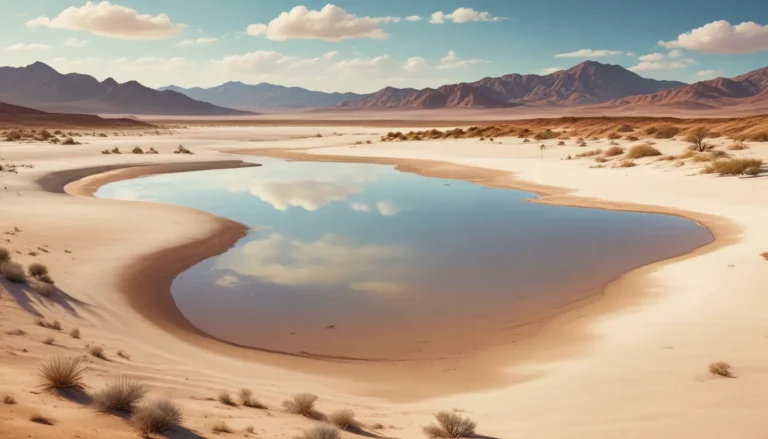A Note About Images: The images used in our articles are for illustration purposes only and may not exactly match the content. They are meant to engage readers, but the text should be relied upon for accurate information.
Welcome to the breathtaking world of mountain ranges, where nature’s wonders unfold in majestic beauty. From the towering peaks of the Andes to the highest summits of the Himalayas, these geological marvels hold a wealth of significance in our world. Join us on a riveting journey as we uncover 12 mind-blowing facts about mountain ranges, diving into their geological, ecological, and cultural relevance. So buckle up and get ready to be astounded by the incredible wonders that mountain ranges have to offer!
Unlocking the Secrets of Mountain Ranges:
- Mountain ranges, such as the Himalayas and Andes, are sculpted by tectonic forces and volcanic eruptions, creating awe-inspiring landscapes and serving as hubs of biodiversity.
- They play a crucial role in the Earth’s water cycle, serving as sources of rivers and freshwater ecosystems, while also acting as natural barriers between civilizations.
Discover the Highest Peak on Earth: The Himalayas
Embark on a journey to Asia and behold the towering grandeur of the Himalayas, home to the world’s highest peaks. Stretching across five countries, this mighty range boasts Mount Everest, standing tall at a staggering 29,029 feet above sea level.
Unveiling the Forces of Nature: Mountains and Tectonic Activity
Experience the dynamic forces at play as mountain ranges are shaped by tectonic activity, driven by the movement of Earth’s lithospheric plates. Collisions and separations of these plates give rise to majestic peaks and rugged landscapes.
Journey Along the Longest Mountain Range: The Andes
Immerse yourself in the splendor of the Andes, stretching over 7,000 kilometers along South America’s western edge. Home to towering peaks like Aconcagua, this expansive range captures the essence of natural beauty.
Explore the World of Biodiversity: Mountain Ranges as Hotspots
Delve into the vibrant ecosystems of mountain ranges, teeming with diverse flora and fauna. Their varying elevations and climates create unique habitats for a plethora of plant and animal species, including rare and endangered ones.
Witness the Power of Volcanic Activity: Cascades and Beyond
Experience the fiery origins of volcanic mountain ranges, such as the Cascade Range in the United States. Volcanic eruptions and lava flows sculpt landscapes and nurture fertile soils vital for sustaining life.
Embrace the Essential Role of Mountain Ranges in Water Resources
Marvel at the crucial role mountain ranges play in the Earth’s water cycle. High altitudes receive abundant precipitation in the form of snow and rain, serving as vital sources for rivers, streams, and freshwater ecosystems downstream.
Conquer Nature’s Challenge: Mountain Climbing
Embark on the ultimate adventure of mountaineering, where physical stamina, mental fortitude, and meticulous planning are essential. Scaling the treacherous slopes of towering mountains offers a unique thrill for adventurers worldwide.
Discover the Splendor of the Great Dividing Range
Unearth the captivating beauty of the Great Dividing Range, spanning over 3,500 kilometers along Australia’s eastern coast. Known for its diverse landscapes, ancient rainforests, and rich wildlife, this range is a testament to nature’s creativity.
Embrace Mountains in Culture and Spirituality
Celebrate the cultural and spiritual significance of mountain ranges throughout history. Revered as sacred sites, pilgrimage destinations, and sources of artistic inspiration, mountains hold a special place in the hearts of many.
Experience Winter Wonderland: The European Alps
Embark on a snowy escapade to the European Alps, renowned for their snow-capped peaks, world-class ski resorts, and picturesque alpine villages. A haven for winter sports enthusiasts and nature lovers alike, the Alps offer a magical playground.
Navigate the Challenges of Climate Change
Navigate the impact of climate change on mountain ranges, where rising temperatures pose threats like glacier melting, altered precipitation, and increased natural disasters. Urgent conservation efforts are essential to safeguard these fragile landscapes.
Embrace Mountains as Natural Boundaries
Reflect on the historical significance of mountain ranges as natural boundaries, shaping cultural, political, and economic dynamics. Their imposing presence has influenced the development of civilizations and delineated borders for centuries.
Embark on a journey of discovery with these mind-blowing facts about mountain ranges, immersing yourself in their captivating beauty, geological importance, and ecological significance. From the majestic peaks of the Himalayas to the diverse landscapes of the Andes, mountain ranges continue to inspire and enchant us with their awe-inspiring presence.
Conclusion: Embrace the Majesty of Mountain Ranges
In conclusion, mountain ranges stand as majestic testaments to nature’s grandeur, stirring our senses and igniting a sense of wonder. The 12 mind-blowing facts shared in this article only scratch the surface of the vast wealth of knowledge and beauty that mountain ranges hold. Whether you’re a nature enthusiast, an adventure seeker, or simply someone who appreciates the beauty of the natural world, exploring mountain ranges should undoubtedly be on your bucket list. Venture out and immerse yourself in the breathtaking vistas, stunning landscapes, and rich biodiversity that mountain ranges have to offer. Happy exploring!
FAQs: Unveil More Secrets of Mountain Ranges
-
How are mountain ranges formed?
Mountain ranges are sculpted by geological processes like tectonic plate movements, volcanic activity, and erosion, shaping their majestic peaks and rugged landscapes over time. -
What is the highest mountain range in the world?
The Himalayas reign as the highest mountain range globally, spanning countries like Nepal, India, Bhutan, and China, with Mount Everest as the crowning glory. -
Are mountain ranges important for the environment?
Absolutely! Mountain ranges play a critical role in supporting global ecosystems, acting as natural barriers, influencing weather patterns, and providing habitats for diverse plant and animal species. -
Can you find snow in mountain ranges year-round?
In colder regions with higher elevations, snow can persist year-round, forming perpetual snowfields and glaciers that contribute to downstream water sources. -
Can mountain ranges impact climate?
Mountain ranges have a significant impact on local and global climates, creating weather patterns like rain shadows and influencing temperature variations through air mass movements. -
Are mountain ranges prone to natural disasters?
While mountain ranges can be susceptible to natural disasters like avalanches, landslides, and volcanic eruptions, the risk level varies depending on geological factors and human activities in the region.
Embark on a journey of discovery through the majestic world of mountain ranges, uncovering their secrets, marvels, and significance in our natural world. Join us in celebrating the awe-inspiring beauty and profound importance of these geological wonders that continue to captivate and inspire us.






